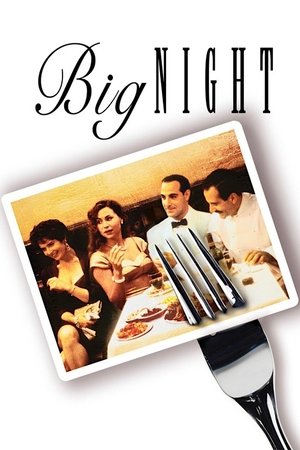
Big Night
**A forgotten film about naive, deeply believable and human people.** There are certain films where everything depends on the actors' performance, and this is one of them. The dialogues are truly rich, the development of the characters and the ways they interact is highly valued, the plot is reduced to the simplest it can be and almost everything happens in the limited space of the Italian restaurant. It looks like a play, and that even leads me to believe that the film could be an adaptation of a play. Such simplicity and minimalism obviously mean that there was no significant financial investment on the production side. Cheap to make, with touches of indie cinema and quality personnel in the cast and crew, the film meets the necessary goals to entertain us pleasantly for some time, but it will never be unforgettable for anyone. In fact, it is quite forgotten nowadays, which I completely understand. Technically, the film does everything without mistakes, but it doesn't take any risks: the cinematography doesn't bring anything new or bold moves, rather the regular average that is presented without a single error. In common, the soundtrack is perfectly forgettable and the scenarios, although good and perfectly credible, do not have any particular interest. Even the restaurant is banal, an average establishment without any kind of interest, where you go for the quality of the food and not exactly for the atmosphere. The plot is very simple and works excellently: two brothers, Italian immigrants, have a restaurant that is about to close because they didn't know how to manage it and gain customers; This leads them to listen to the advice of the owner of a competing restaurant and invite singer Louis Prima to dinner in the hope of boosting the business. The brothers are, each in their own way, perfectly naive! If one is unable to understand that in a business like that, the customer is in charge and not the cook, the other decides to trust the advice of someone who had every reason to harm them. This makes them human, believable, and it is impossible not to suffer for them. The naivety is not just theirs: the character of Minnie Driver is also deeply naive in her own way, in the way she becomes romantically involved and allows herself to be deceived. Stanley Tucci, intelligently, collaborated directly in writing the script and the result was one of the best works of his career, with the actor in a role that he tailored to his own abilities and qualities, without prejudice to his colleagues, to whom he gives the necessary space to showcase their talent. Thus, Tony Shalhoub also makes the film an authentic calling card, proving his qualities as an actor. In a more reserved position, we must also highlight the collaboration of Minnie Driver and Ian Holm, and also the special participation of Isabella Rossellini, who brightens the film with her occasional but very committed collaboration.
